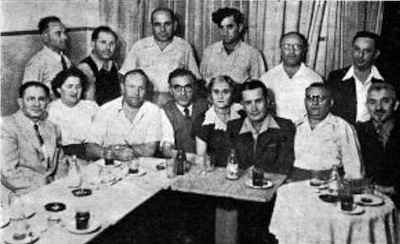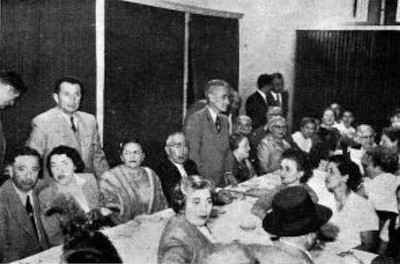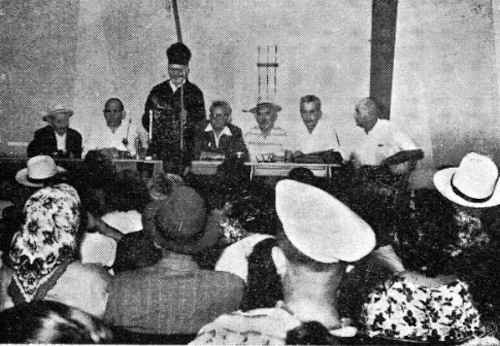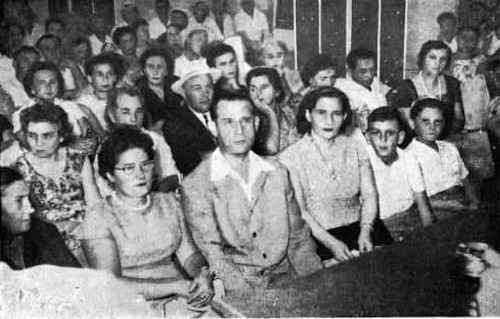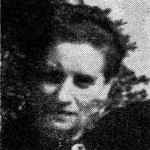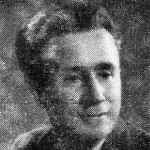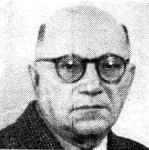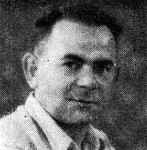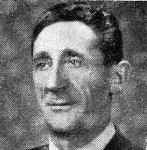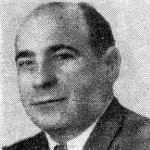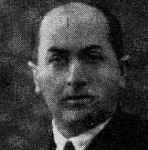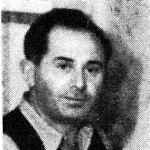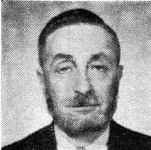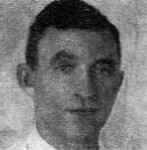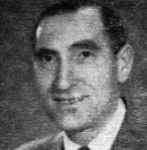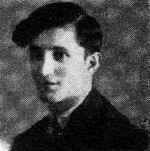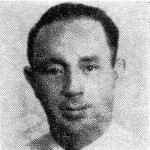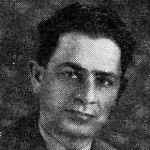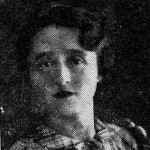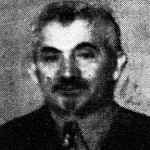[Page 614]
Sokolov in Israel
History and Activity Report of Khayim Bar-Sholem (Fridlub), President
Translated by Tina Lunson
Making aliye to the Land of Israel by the Jews of Sokolov dates back before the beginning of this century. Solitary Jews whose tendency was exclusively a religious one, traveled to Erets Yisroel in order to prepare the earth among the graves of the ancestors and to rest “over a hundred years” in the holy ground.
But the movement whose goals were Zionist – the youth aliye – first began in the 1920s. In the beginning it was a small stream and continually enlarged through all the immigrants until the outbreak of the Second World War.
The driving force of that aliye was the terrible situation of the Jews in Sokolov, as in Poland in general.
Social life as it arose after the overthrow of the tsarist regime constricted the development of political and professional organizations and educational and cultural institutions.
The longings and desires to bring about a foundational change in Jewish life encountered a resistance of hateful strength, and the hopes that had arisen earlier – that in a liberated Poland a liberated Jewish life could exist too – were disappointed.
With the rise of independent Poland it was not enough that Jew-hatred was not squelched among the Polish population, but it was only strengthened by the government and municipal institutions. No Jewish official or Jewish worker could be found in a government or a town institution. It was evident that the Jews had built the majority of the town. The Polish economic institutions were in fact geared to stymie the sources of livelihood in the Jewish population.
It was no better in the areas of educational and cultural activities. The Jews had to struggle every day against the tendency of stealing an opportunity [and] to protect their spiritual and cultural particularity.
Under the pressure from the hateful, non-Jewish environment, Jewish life in the town changed into a kind of economic and cultural ghetto – a life without space to live and without perspective for tomorrow.
[Page 615]
Appeal to Sokolover in the World soon after the Second World War
Union of Sokolov Landslayt in the Land of Israel
To the Sokolov Jews all over the world!
Pleas for help reach us every day from sisters and brothers of our Sokolov family who have become refugees.
They call out from the masses in Germany. From every corner of the European hell. From the ports that lead to Erets Yisroel and from the hordes in Capri. Help us out in our desperate situation. Help us to raise up our ruined lives anew! After 7 years
of indescribable torment they wait for the end of their troubles, for a solution that will allow them to regain their Jewish lives.
But a solution has not come about
A few of them have been rescued to date, to America and other lands. A few dozen have already merited making aliye to Erets Yisroel, where they have renewed their lives in the lap of the fatherland.
But the large majority, hundreds of souls, still find themselves among the masses in Germany. Or on the roads to Erets Yisroel and among the masses in Capri and their last and only refuge point in Erets Yisroel.
The immigrant aid organization [Irgun] in Erets Yisroel is doing everything possible in order to help them in their horrible situation. The organization supports Sokolov refugees who come to Erets Israel with a certain sum (up to 500 dollars for a family) with the goal of finding a residence, which for us is a difficult problem and thus helps many to their settlement in the land. The organization also sends money and packages to the masses in other places (we have also sent aid to Russian).
But our means, which come from a sustained monthly stipend from all the Sokolov immigrants in Erets Yisroel, are small against the huge need, against the pressing need to help each Sokolov refugee who needs our help.
Sokolov Jews!
The need of our tormented refugees – children of our recently-destroyed home Sokolov – is huge and the aid that we, those left alive, bring to them must be huge.
The organization in Erets Yisroel has decided to double the monthly payment by the amount of 2% of the monthly minimum revenue, and appeals to each Sokolover Jew in every corner of the world to increase their allotment to the benefit of this aid action.
Sisters and Brothers!
For us, the tragic witnesses to the murderous destruction of our beloved and sacred home, of our nearest and best, there is only one comfort here
Help the survivors to rebuild their lives anew, their Jewish lives.
Committee for the Sokolov landslayt in Erets Yisroel:
Yekhiel Arnshteyn, Barukh Batshan, Motl Brener-Rubinshteyn, Yankev Grinberg, Fayvl Hershenbarn, Zelig Zaremski, Meyshe Kats, Khayim Fridman. Elize Farbman Shtanger, Khane Rubinshteyn, Yitskhak Rubinshteyn, Ben-Tsien Shulevitsh, Shabsil Shtutman.
[Page 616]
The party-particular, non-Zionist, revolutionary slogans for the right of the Jews in place did not find resonance with the youth, who were reared on the values of unity; for them it was clear that all those solutions had no content in the reality of goles [Exile]. Thus they turned to the Zionist ideal, to the ideal of the Jewish revolution – the return to Zion.
There was an aliye of youth who wanted to exchange their dark reality for their own lifestyle – through changing themselves into workers, in creating the dreamed-of fatherland.
The seeds that were sown by the first group of Zionists from Sokolov bore fruit and the Sokolov landslayt began to contribute their part to the rebuilding of the land.
This did not come easily for the young arrivals. They were in the midst of difficult struggles: with their parents who did not want to be separated from their children; with the environment that was disparaging, even devaluing, of the Zionist solution; and chiefly, with themselves. They struggled with habits and with exilic concepts in themselves, in order to prepare themselves through personal revolution to be creators and workers in the fatherland.
Zelig Zaremski tells about that time, when he came to Erets in 1924, that he met here the Sikolov landslayt Dovid Berg's son (who was active in the ministry and in the Hagunah) Hershl Shvartsbort, Yitskhak Reyzman and Kreytman. Later, the Sokolover Meshe Rubinshteyn, Khayim Yosl Stolar and Breytman with their families arrived.
Other Sokolover came after that and although no immigration organization existed at that time, they helped the new immigrants find work, even for unskilled people. A separate task was to locate housing for those arriving from the old home, and to concerns oneself with their issues and difficulties which every new immigrant has to manage in the early times.
So the Sokolov landslayt lived communally among themselves until the Second World War, and becoming aware of the destruction they gathered all the landslayt and founded the organization.
Friend Yekhiel Arnshteyn, arriving in 1925, relates that he met very few Sokolover. For a loan or for work they always turned to Zelig Zaremski (thus he was called “the Sokolover minister of labor”). It was difficult to arrange jobs at that time.
Among the zealots of that time, besides Zelig Zaremski,
[Page 617]
were Meyshe Khayim (Yosl's) Rubinshteyn and his sons. They also concerned themselves with helping the new immigrants. Even today, after dozens of years, one sees Sokolover in jobs that Zaremski arranged for them.
When the first reports came from Sokolov about the economic boycotts by the Poles, everyone taxed himself and the aid was promptly sent off to the old home.
When I arrived in Erets in 1934 I found the group of immigrants – the majority one-time yeshive boys who grew up and were educated in an environment that disdained physical work – rooted in the laboring life and happy with it.
Among them I found an atmosphere of mutual help and a hearty readiness to encourage each new immigrant. The concern and the readiness to help of those first ones was turned over in the continuation of the immigration and a tradition of the immigrants who came after them.
And if today we merit having about 300 families from our town living in Israel, we can boldly attribute that in large measure to the merit of the heritage of encouragement and mutual help that was rooted in that society.
Murdered Sokolov, where the blood of her sons and daughters was spilled by the despicable of the human race, was reestablished as an organic part of the renewed fatherland. Sokolov has thrown off its exilic woes and put on the concerns of creator who carries hope for the future in its bosom.
As mentioned, even before the official founding of the organization the arrival of each new immigrant from Sokolov during that time spontaneously brought together the zealous people in order to help with his getting settled. They concerned themselves with work and with a roof over their heads. The possibilities of help were not ongoing but the friendly warmth with which the new immigrant was taken in strengthened his moral stance and helped him in the struggle with absorption.
In 1942 – as soon as there came the first horrible reports of destruction – a meeting was call for Sokolover in Tel-Aviv and environs, at which the first committee of the Sokolov Society in Israel was elected.
The committee elected in the home of Khaye Zilberman was: Yekhiel Arnshteyn, Khayim Bar-Sholem (Fridlub), Zelig Zaremski, Avrom Shteynvaks, Khanetshke Rubinshteyn and Yitskhak Rubinshteyn.
At that same meeting there was a decision about joint-action among the Sokolover in Israel for help for the survivors.
[Page 618]
|
|
Meeting of the Sokolov Committee in Israel, 1949
From right to left (standing): Ben-Tsien Shulevitsh, Fayvl Hershnboym, Yitskhak Nehari, Meyshe Hokhberg, Yekhiel Arnshteyn
Seated: Benyumin Rubinshteyn, Gad Zakliukovski, Khayim Bar-Sholem (Fridlub), Khantshe Rubinshteyn, Shaulke Elbling, Avrom Shpadel, Freydl Arnshteyn and Yitskhak Rubinshteyn |
|
|
Welcome to the Sokolover from America
in Israel during yom-ha'atsmaut [independence day] |
[Page 619]
In a short time nearly 500 pounds [sterling] was collected, about 2500 dollars in those days. The first work consisted of sending packages of food and clothing for the refugee Sokolover in Russia.
A little later, with the arrival of the first immigrants from the illegal immigration, the Committee gave contributions toward settling them.
It is worth emphasizing that the contemporary Sokolov immigrants to Israel consisted almost exclusively of wage-earners who earned a poor living with great effort but when the impassioned aid appeal came from the Committee, they stinted themselves in order to take part in the action.
With the arrival of the great immigration in 1948-1950 – after the establishment of the State of Israel – the situation of the Committee became critical. The aid from outside was small and the local, limited means were in no way proportionate to the needs of helping the stream of immigrants.
A break in the stagnation of the Committee's activity came with the visit of the Rozenboym family from Indiana, United States. A son of Israel Hirsh Rozenboym of blessed memory, the shamesh of the New Study House, the family Rozenboym gifted over a short time more than four thousand pounds to the fund for social help in the name of their parents.
That significant help brought new life to the activities of the Committee, which began with new spirit to seek ways to create a larger financial basis for its work.
Later, in 1953, after the visit by the energetic social activist and member of the Committee of the Sokolov Landsmanshaft in Chicago Serke Gilbert, her Committee at her suggestion sent over a sum of 6000 pounds for a gemiles khesed [interest-free loan fund] for constructive help. Not long after that we received more than 5000 pounds from the New York Landsmanshaft through the energetic President Mordkhe Khayne. We also received significant help from the Paris landsmanshaft.
Those sums which the Committee received, made possible the founding of the gemiles khesed fund for constructive help for new immigrants. In order to enlarge the fund and ensure the normal repayment of the debts, we created partnerships with two local banks which set aside an equal sum obligated to carry the responsibility for the repayment of the debts. Thus the fund for the loans was enlarged by one hundred percent.
[Page 620]
The interest-free loan fund fulfilled its assignment with great success. Over its many years of existence it gave out hundreds of loans in a total of 200,000 pounds for constructive goals and with that became a significant factor of absorbing immigrants of the Sokolov immigration.
The gemiles-khesed fund was not sufficient to cover all the need for help. There were difficult social cases for which the funds had to be given without a contingency to repay it. To that end we created a fund for social aid. The base of that fund was, as mentioned, the subsidy from the family Rozenboym. Further revenue for the fund came from help from other countries, through the Chicago Committee which twice a year sent significant sums; from the Paris Committee which sent help for that project according to their capabilities; and from individual donors and from collections conducted in Israel. That fund provided great help for both new immigrants and for difficult social cases of the very observant, providing over 5000 pounds over the span of its activity.
The Committee is in constant worry about producing means for the fund to operate.
Memorial services for the murder of the Sokolov martyrs were arranged each year since the reports about the destruction of Sokolov. Hundreds of Sokolover gather at the memorial services – that is, the majority of the Sokolover in Israel share the common pain and solidarity of the Sokolov witness.
Thus the Committee concerns itself with the Sokolov tourist in Israel, that they be included with all their friends and acquaintances in Israel. To that end we arrange solemn gatherings at which points of view and information about Sokolover in the diaspora and in Israel are exchanged.
The Committee considers it a sacred debt to eternalize the memory of the Sokolov community, and to relate for the living and for the coming generations about its life and destruction. Our appeals to the Sokolov committees and to individuals in the diaspora have found a warm resonance. Special committees have ben set up in Chicago, New York. Los Angeles, Paris, which have spent for this book and also taken part to a large extent in determining its content. The work of publishing this book has been hard, both in the financial and in the literary sense. We had to concentrate a sum of over 10,000 pounds while protecting the decision not to use any money from the gemiles-khesed fund.
In honor of the vow on Mount Sinai for the destroyed former Jewish communities in Europe we erect a gravestone to the memory of our Sokolov martyrs.
[Page 621]
The Irgun Yotsey Sokolov b'Israel, encouraged by the tasks it has fulfilled up until now, is prepared with redoubled energy set about its work in order to create the bridge that unites the widespread Sokolov populations all over the world.
|
|
| Presidium of the memorial service in 1959 in Tel-Aviv |
[Page 622]
|
|
| Presidium of the memorial service in 1959 in Tel-Aviv |
[Pages 623 – 624]
Summary version of this Yiddish article, in Hebrew.
[Page 625]
Remember
The Organization for Sokolov in Israel remembers with deep sorrow and respect and honor the deceased and fallen Sokolov immigrants of the first builders of the land.
Dovid Ayzenberg, Avrom Batshan, Sore Leye,Batshan, Matisyahu Ben-Yebit, Shmuel Avrom Barnshteyn, Dovid Ber, Dov Goldshteyn, Khane Goldshtyen, Mordkhe Grinberg, Meyshe (Ben Khayim) Hokhberg, Yehoshe Helfman, Abish Vierzshbe, Yankev Vishni, Yisroel and Ashtu Vaysbort, Gad Zaklikovski, Yosef Zilberman, Avrom Zayants, Khaye Zayants, Yankev Lustigman, Yekhiel Landoy, Miriam Levin, Khayim (Ben Mendl) Lashitski, Avrom Dovid Milgrom, Feyge Milgrom, Simeon Midlarski, Tuvye Mandlboym, Meyshe Naymark, Yekhiel Dovid Sribnik, Pinkhas Sobol, Matisyahu Elster, Pinkhas Elster, Khane Elster, Khane Bashe Elenberg, Simeon Vashtu Farbman, Kalman Yekhiel Fridman, Khanokh Fshenye, Miriam Fshenye, Tsvi Tsibula, Yosef Kapito, Avrom Shteynvaks, Elieyzer Shaferan, Khaye Brokhe Salevitsh, Sender Rubinshtyen, Leybush Rubinshtyen, Binyumin ben Leybush Rubinshtyen, Zlata Rubinshtyen, Meyshe (Ben Khayim Yosef) Rubinshtyen.
[Page 626]
|
|
|
|
|
|
|
|
| |
|
|
|
|
|
|
|
|
| |
|
|
|
|
|
|
|
|
| |
|
|
|
|
|
|
|
|
Members of the Council and activists of the Organization of Sokolover in Israel
From right, alphabetically: Y. Arnshteyn, A. Bialilev, (Rev. Commission). Kh. Bar Sholem (President), M. Brener, M. Hokhberg, Z. Zaremski (Treasurer), M. Kats (Vad habank) Y. Milgrom, Y. Nahari, B. Nitson Vad habank), Sh. Elbling, P/F Rafalovitsh, B. Rubinshteyn, Kh. Rubinshteyn, Y. Rubinshteyn (Rev. Commission), B. Shulevitsh. |
This material is made available by JewishGen, Inc.
and the Yizkor Book Project for the purpose of
fulfilling our
mission of disseminating information about the Holocaust and
destroyed Jewish communities.
This material may not be copied,
sold or bartered without JewishGen, Inc.'s permission. Rights may be
reserved by the copyright holder.
JewishGen, Inc. makes no representations regarding the accuracy of
the translation. The reader may wish to refer to the original material
for verification.
JewishGen is not responsible for inaccuracies or omissions in the original work and cannot rewrite or edit the text to correct inaccuracies and/or omissions.
Our mission is to produce a translation of the original work and we cannot verify the accuracy of statements or alter facts cited.
 Sokołów Podlaski, Poland
Sokołów Podlaski, Poland
 Yizkor Book Project
Yizkor Book Project
 JewishGen Home Page
JewishGen Home Page
Yizkor Book Director, Lance Ackerfeld
This web page created by Jason Hallgarten
Copyright © 1999-2024 by JewishGen, Inc.
Updated 01 Apr 2024 by JH
